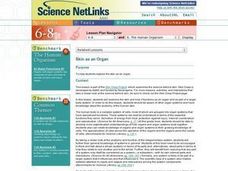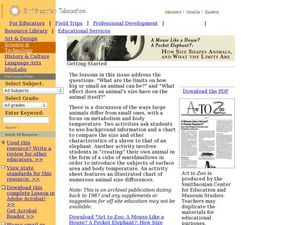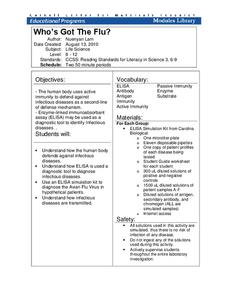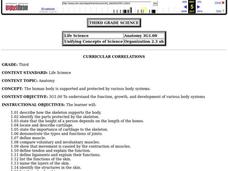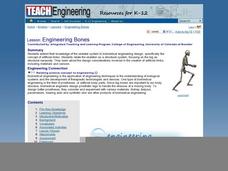Tinybop
The Human Body
Examine the systems of the human body with a bold, charming, and kid-friendly application. This noteworthy tool is certain to get kids interested what goes on inside of them! The eye feature uses the tablet camera to view images and show...
Southwest Educational Development Laboratory
The Human Body
Nothing is more relevant than the study of the human body. A series of 10 human body lessons begins with growth, ends with reproduction, and hits all the major systems in between. Each lesson provides opening and closing activities as...
Curated OER
Skin: Skin Prints
Learners explore human anatomy by participating in a print experiment. In this human skin instructional activity, students define the term "epidermis" and utilize computer paper, pencils, tape and baby wipes to create a print of their...
Curated OER
The Circulatory System--Part III
Students research the process for the preparation of a soup. Students explore the safety issues of food preparation. Students, after presenting their soups to the class, will eat their soups that they have prepared.
Curated OER
The Magic School Bus Flexes Its Muscles
Students learn along with Ms. Frizzle's class. In this Magic School Bus lesson plan, students explore the inside of the human body as they compare the bones and joints of a chicken wing with their own hands and arms.
Curated OER
Skin as an Organ
Students are introduced to human skin as an organ of the body with many roles, functions and interactions with other organs. They investigate the integumentary system in groups and complete a worksheet with their findings.
Curated OER
The Magic School Bus Inside Ralphie
Students learn along with Ms. Frizzle's class. For this Magic School Bus lesson plan, students discover that skin protects our bodies the way apple skin protects an apple.
Curated OER
Disease Fighters
Students study how the human body fights off disease causing agents. In this human health lesson students study the use of antibiotics and the problems misuse can cause.
Curated OER
The Strength of the Muscular System
Seventh graders investigate the strength of the muscular system. They explore voluntary and involuntary muscle movement and discuss the types of muscles: cardiac or heart, skeletal, and smooth. They visit stations to answer questions...
Curated OER
My Five Senses
Students investigate the five senses. In this senses instructional activity, students explore the nervous system. Students examine how the body receives information through the five senses.
Curated OER
How Size Shapes Animals
Learners investigate how size affects large and small animals differently. In this animal lesson plan, students determine how size affects different animals by constructing their own animal out of marshmallows. Once learners create...
Cornell University
Who’s Got The Flu?
Become an immunologist for the day. Scholars elicit the use of the enzyme-linked immunoabsorbent assay (ELISA) to diagnose an infectious disease. Through the process, they learn about the immune system response to infectious diseases.
Curated OER
Skeletal System
Third graders describe and identify the parts of the skeleton and how they support the body. They observe two chicken bones that have been soaked in vinegar for 5 - 7 days. They observe the bone's appearance after it has been removed...
Curated OER
Hand Sensitivity
Students experiment with the sense of touch. In this tactile lesson plan, students determine the most sensitive area of the hand. Students experiment by describing objects through touch only. Students compare the amount of sensory data...
Curated OER
Artificial Heart Technology
Students discover the basics of the human heart and how it functions. They examine the whole circulatory system and how an electric heart would work inside the human body. They can choose to perform their own surgery by following...
Curated OER
MuscleMania
Students learn three different types of muscles. By building a model of the arm, they learn its basic anatomy and how muscles function in relationship to bones. They perform an experiment on the relationship between muscle size and...
Curated OER
How Does Radon Affect Human Lungs?
Middle schoolers identify the different parts of the respiratory system of the human body. They work together to complete an activity and worksheet about the effects of radon on the lungs. They research lung diseases if time permits.
Curated OER
Fetal Pig Dissection
In this dissection worksheet, students use a preserved fetal pig to learn more about anatomical terms and body systems. Detailed diagrams and instructions are provided to guide the students through the dissection. Students complete...
Curated OER
Fighting Infection
Pupils study immune responses and the structures that are related to immune cells functions. In this fighting infection lesson plan students construct antibody complexes and model the interaction of the immune system when it is...
Curated OER
Anatomy and Physiology "Quickies"
Students use a variety of creative writing tools within this assignment: poems on particular organ systems, write a short story and/or create a word graph. They are involved in a demonstration of lactic build up in the muscles, a...
Curated OER
Engineering Bones
Pupils identify the features of a prosthetic limb and explain how engineers are involved in the prosthetic design. In this bone engineering lesson students describe the design criteria that goes into choosing the materials that go...
Curated OER
Mapping the Homunculus
Students determine the relative number of nerve endings located in the skin. By calculating the reciprocal of these measurements, students have the appropriate data for predicting the relative size of the homunculus found on the cerebral...
Curated OER
Diversity And Adaptations Of Organisms
Seventh graders demonstrate the processes of science by posing questions and investigating phenomena through language, methods and instruments of science. They study the body features or systems of several animals.
Curated OER
Broken Bones
Students listen to a lecture on broken bones. They review the proper first aid techniques and practice setting splints on one another. They observe X-rays and animal bones.





